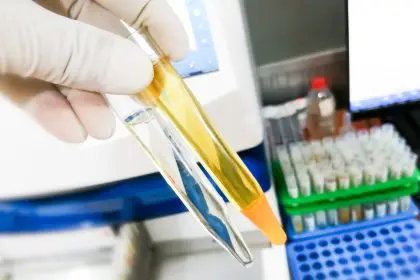When a child inherits a genetic condition, it often means both parents unknowingly carried genetic variations that, when combined, led to the disease. Modern genetic testing now allows families to understand their risk factors better, though many face difficult decisions about whether to pursue testing.
1. Cystic fibrosis affects breathing and digestion
This life-altering condition affects about 35,000 Americans, making everyday breathing a challenge. Children inherit it when both parents carry a specific gene mutation, though carriers often show no symptoms themselves.
The effects begin early, with thick mucus building up in the lungs and digestive system. New treatments target the underlying genetic cause, offering hope where once there was little. Recent breakthroughs include medications that help correct the faulty protein responsible for the condition, allowing many patients to breathe more easily and digest food better.
2. Duchenne muscular dystrophy changes childhood
Primarily affecting boys, this condition begins showing signs between ages 3 and 5. Parents often notice their child struggling to run, climb stairs, or get up from the floor.
Recent medical advances bring new optimism. Gene therapy trials show promising results, and new medications help maintain muscle strength longer. Physical therapy and specialized equipment help children stay active and independent as long as possible.
3. Sickle cell disease impacts blood flow
This inherited blood disorder affects approximately 100,000 Americans, primarily those with African ancestry. Red blood cells become crescent-shaped, causing pain and potential organ damage.
Recent years have seen remarkable progress in treatment options. Gene therapy trials have helped some patients produce healthy blood cells, while new medications reduce pain crises and complications.
4. Polycystic kidney disease affects organs
This condition causes multiple cysts to grow on the kidneys, potentially leading to kidney failure over time. It affects about 600,000 Americans, making it one of the more common inherited disorders.
New treatments focus on slowing cyst growth and preserving kidney function. Lifestyle changes, including diet modifications and blood pressure control, help many patients maintain kidney health longer.
5. Neurofibromatosis causes tumor growth
This group of conditions causes tumors to grow along nerves throughout the body. It affects children and adults differently, with symptoms ranging from mild to severe.
Research continues to uncover new treatment approaches. Clinical trials testing targeted therapies show promise in shrinking tumors and managing symptoms more effectively.
6. Hemophilia affects blood clotting
This bleeding disorder, which prevents blood from clotting properly, historically limited life expectancy severely. Today, new treatments allow patients to live full, active lives.
Advanced therapies, including longer-lasting clotting factors and gene therapy trials, have transformed treatment options. Many patients now self-administer preventive treatments at home, reducing bleeding episodes significantly.
7. Early-onset familial Alzheimer’s disease
While most Alzheimer’s cases occur later in life, this inherited form can begin in people’s 30s or 40s. It affects about 200,000 Americans, causing memory loss and cognitive decline at an unusually young age.
Researchers focus on understanding how genetic mutations lead to early onset, developing treatments that target these specific genetic changes. New blood tests help identify the condition earlier, allowing for better planning and care.
Finding support and treatment
Families facing these conditions often find strength in connecting with others sharing similar experiences. Support groups, both online and in person, provide valuable resources and emotional support.
Medical centers specializing in genetic conditions offer comprehensive care teams, including genetic counselors, specialists, and mental health professionals who understand the unique challenges these families face.
Research brings new hope
Clinical trials testing innovative treatments continue worldwide. Gene therapy, which attempts to correct faulty genes, shows particular promise for several conditions. While not yet widely available, these experimental treatments offer hope for future generations.
Scientists also explore ways to prevent these conditions from passing to future generations. New reproductive technologies help some families reduce the risk of passing on inherited diseases to their children.
Resources for families
Genetic counseling helps families understand their risk factors and make informed decisions about testing and family planning. Many hospitals now offer specialized genetic counseling services.
National organizations dedicated to specific conditions provide educational resources, connect families with medical experts, and advocate for research funding.
Understanding insurance and costs
Many families worry about healthcare costs and insurance coverage. Patient advocacy groups often help navigate these challenges, connecting families with financial resources and insurance specialists.
Recent legislation has improved coverage for genetic testing and treatment of rare conditions, though challenges remain in accessing some specialized treatments.
The future of treatment
Medical advances continue to transform how we treat inherited conditions. From gene editing to targeted therapies, new approaches offer hope for conditions once considered untreatable.
Research into early intervention and prevention strategies may help future generations avoid the most severe effects of these conditions.
Taking action
For families concerned about inherited conditions, experts recommend: Speaking with healthcare providers about family history, consulting genetic counselors when planning a family, connecting with support groups and staying informed about new research and treatments.
Conclusion
While inherited conditions present significant challenges, advancing medical science offers increasing hope. Families like the Chens find strength in each other and in the growing community of those facing similar challenges.
Through awareness, support, and advancing medical care, those affected by inherited conditions continue writing their own stories of resilience and hope.
For more information about genetic testing and counseling, consult healthcare providers or genetic counseling specialists who can provide guidance specific to individual situations.











